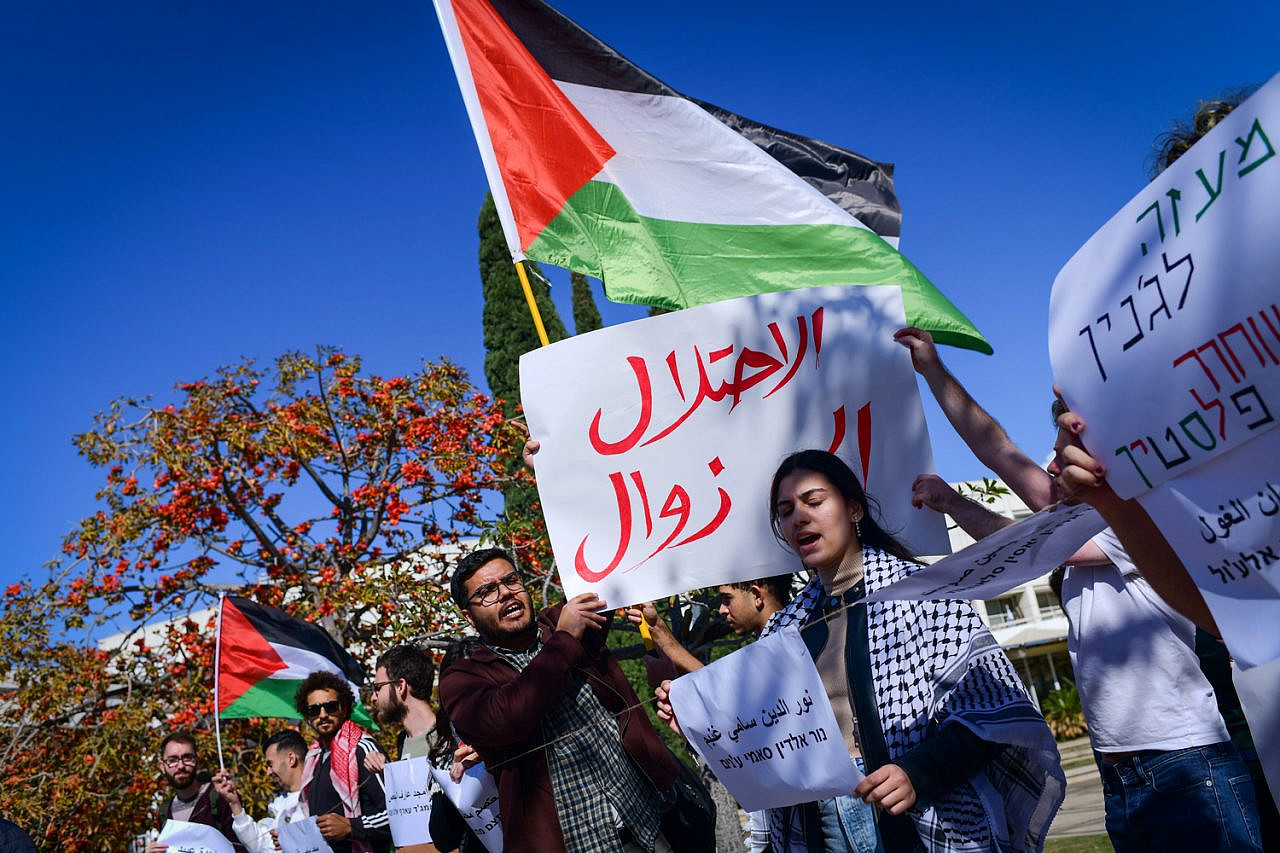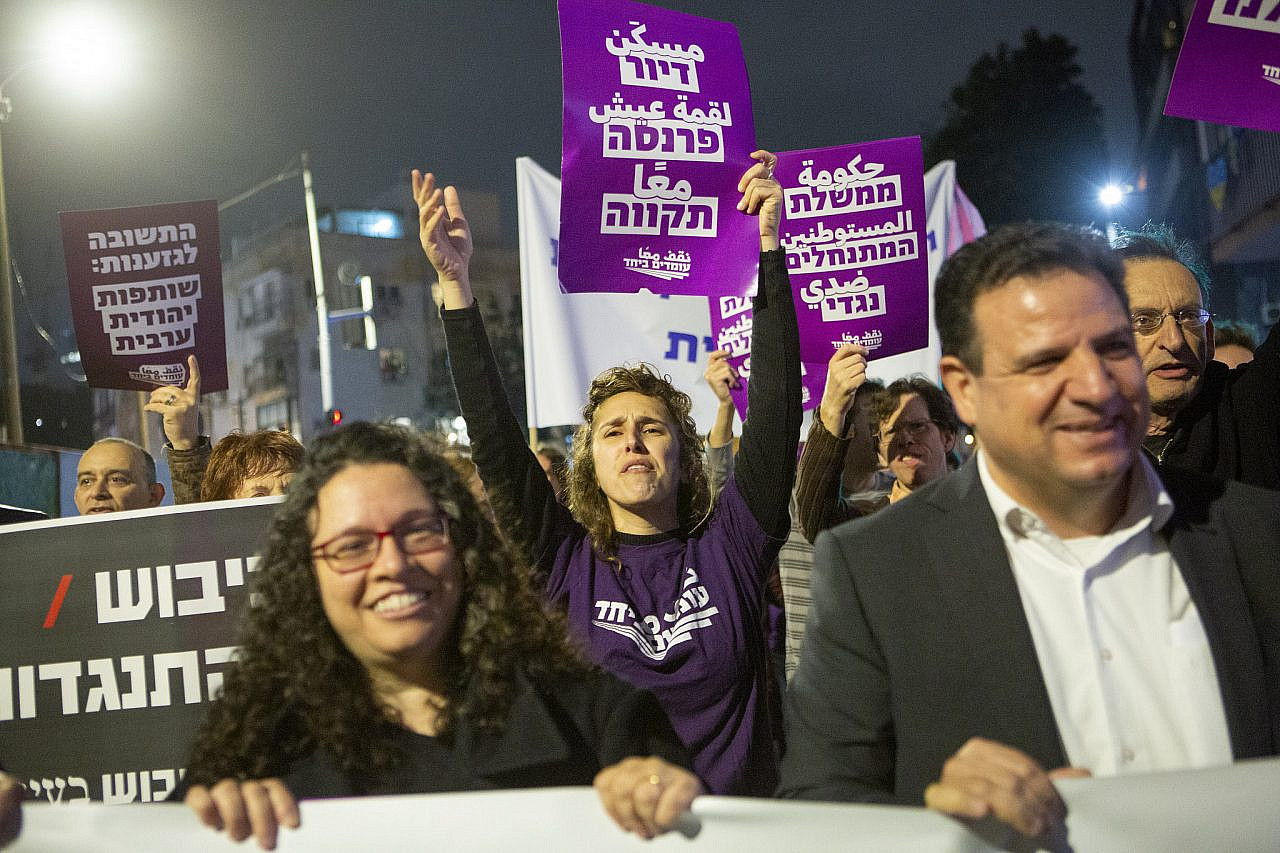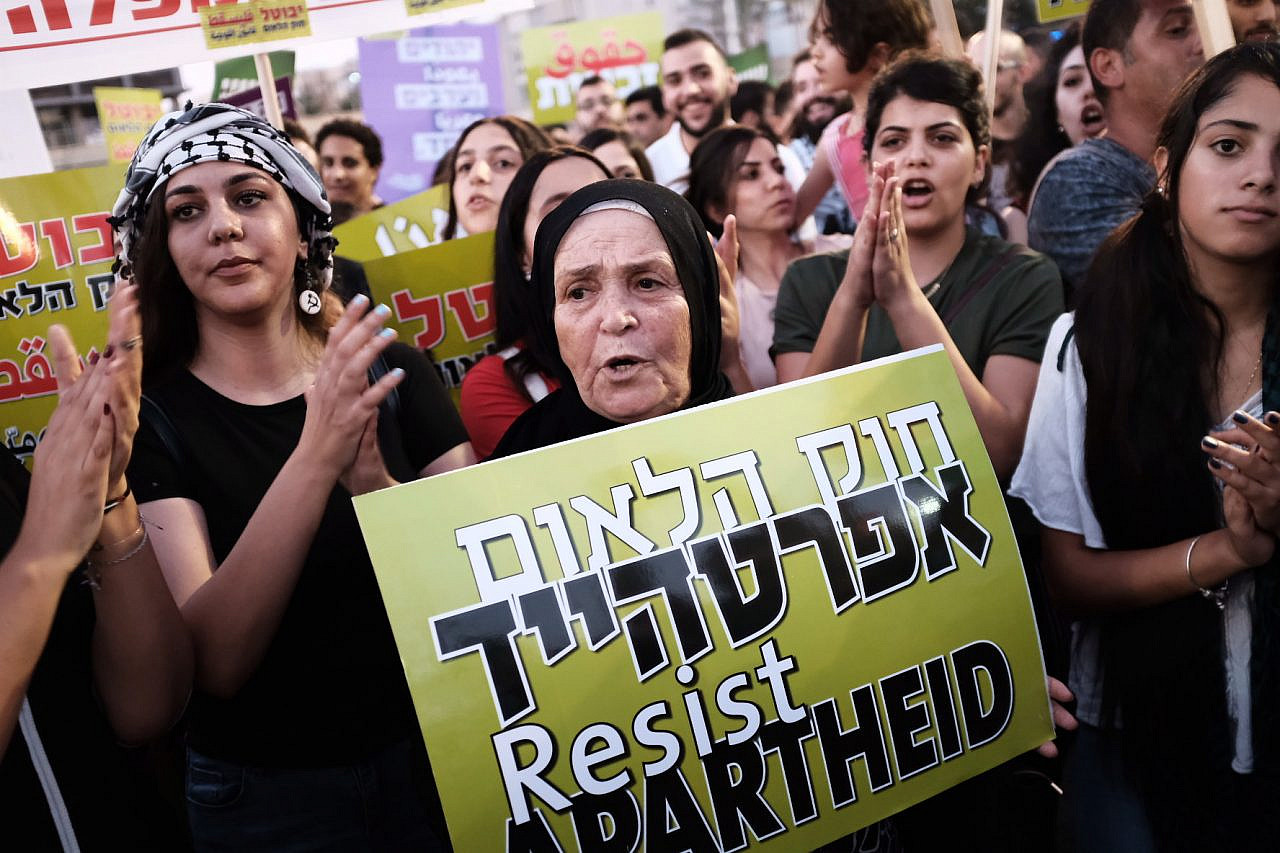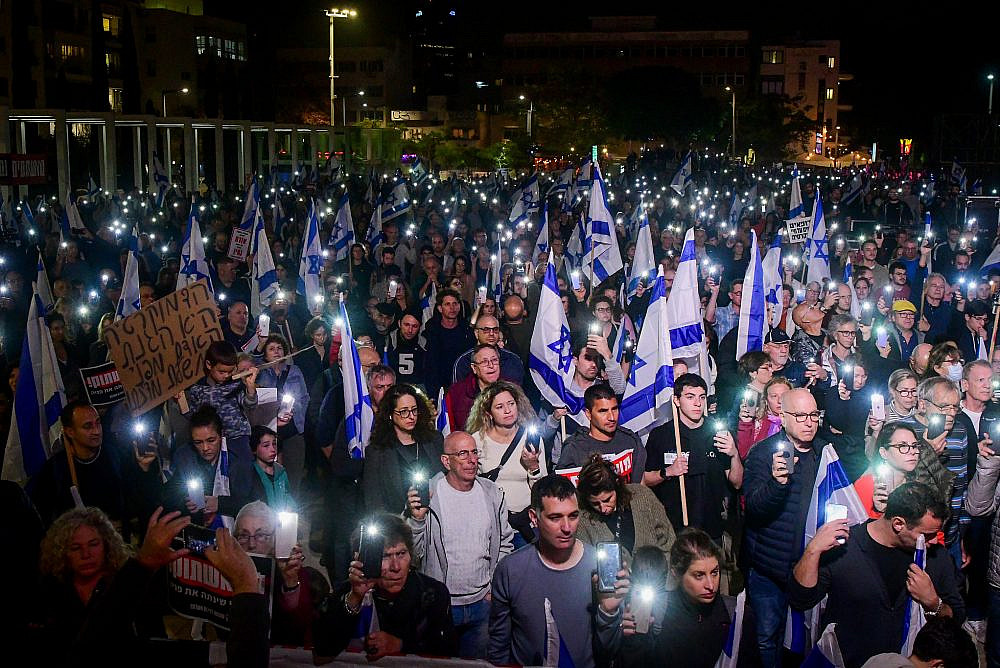Addressing the crowd at the largest demonstration so far against the new Israeli government, held in Tel Aviv on Jan. 21, Dr. Wurud Jayusi stressed the importance of waging a joint Arab-Jewish struggle against the far-right coalition. But not only was Jayusi, who is head of the Arab Academic Institute at Beit Berl College, the sole Palestinian invited to speak at the demonstration, she was also placed last in a long list of speakers.
When she pointed this out to the demonstrators, her criticism was met with applause. Yet it was quite evident that there was a stark absence of Arabs in the protest crowd. This absence has in fact been true of most of the demonstrations against the Israeli government — especially its plans to reform the judiciary — that have been taking place across the country in recent weeks. Even a protest organized by the Arab-Jewish Hadash party in downtown Haifa two weeks ago did not attract many Palestinian citizens.
At first glance, this seems surprising given the overt racism and intense hostility displayed by the new government toward Palestinians in Israel and the occupied territories. But from a lack of identification with the messaging and symbols of the protests to rejecting their narrow goals, Palestinian citizens have no shortage of reasons to stay away. Even so, many Arab political and civil society leaders are urging Palestinians to join the Jewish masses in opposition to the government.
“It is possible that the geographical distance is one of the reasons preventing Arab citizens from participating in the demonstrations in Tel Aviv, but it is certainly not the main one,” Raja Zaatry, a member of Hadash’s political committee with a seat on the Haifa City Council, told +972. “The main reason is that the Arab public — even though it feels that this extreme government and its policies are dangerous — is indifferent to what is happening in the country in general.”
The issues that preoccupy the Jewish Israelis protesting against the government, Zaatry said, are not the same as those preoccupying Palestinian citizens; the demand for equality, resistance to the occupation, and the spread of crime in Arab society do not mobilize thousands of Jewish protesters. “[Israelis] want Palestinian-Jewish partnership only up to a point,” Zaatry said, “and therefore Palestinian citizens do not see themselves as part of this struggle. We are against both this government and the regime. We want equal citizenship for all.”

Zaatry noted that the lack of Palestinian participation in mass demonstrations in Israel is not new; the same was true of the 2011 social justice movement and the 2020-21 “Balfour” protests against Netanyahu, among others. “The protesters today are calling for a return to the status quo ante, to what came just before the Netanyahu government. And we, as Arabs, frankly, have no desire for that,” Zaatry explained.
Jewish protesters, he continued, “call for democracy, but the Arabs say that democracy is not possible without equality, and democracy cannot coexist with occupation and [military] control over millions of people. [Itamar] Ben Gvir and [Bezalel] Smotrich are not the exceptions; they are part of an ideology that is based on Jewish supremacy.”
Defending a court that doesn’t defend Palestinians
At the heart of the current protest movement is an effort to defend the Israeli Supreme Court against the “reform” led by Justice Minister Yariv Levin on behalf of the government. But Palestinian citizens have never had much trust in the Israeli justice system.
“This is the same court that has failed to protect the individual and collective rights of Arabs in the country,” says Sondos Saleh, a former Knesset member with the Ta’al party. “It is the same court that has not prevented land grabs, has not protected Arab citizens from home demolitions under the discriminatory Kaminitz law, has not defended the status of the Arabic language, yet has allowed other unjust and racist laws to go through. Arabs cannot protest in defense of democracy for Jews only. If the protesters are afraid to speak out against the occupation, discrimination, and racism in a clear way, nothing about our political reality is going to change.”
Despite this sentiment, and despite attempts to attack those carrying Palestinian flags at the demonstrations — most of them left-wing Jews who oppose the occupation — Arab political parties have called on their constituents to join the protests. Ayman Odeh, head of the Hadash-Ta’al list, participated in the first large demonstration in Tel Aviv, organized by the Jewish-Arab movement Standing Together on Jan. 7, and has invited Palestinian citizens to follow his lead. Mansour Abbas, head of Ra’am, also attended the Jan. 21 demonstration in Tel Aviv.

But there is a widespread sense that these politicians’ calls were made with much less vigor and conviction than, for example, the calls for the Arab public to demonstrate against violence and crime in Arab communities in recent years, or the call to participate in a protest against the Jewish Nation-State Law in Tel Aviv in 2018.
Hadash-Ta’al, as well as the Balad party, have argued that the policies of the previous “government of change,” led by Naftali Bennett and Yair Lapid, were just as harmful as their predecessors’; Odeh has repeatedly emphasized that the Bennett-Lapid administration killed more Palestinians in the occupied West Bank than any other government in recent years, while an unparalleled number of Jewish worshippers entered the Temple Mount/Al-Aqsa compound under its watch, in violation of the holy site’s “status quo.”
By contrast, Ra’am — which was part of the Bennett-Lapid coalition but now sits in the opposition — has not expressed such strong opposition to right-wing policies in recent years. In 2021, Abbas even signaled his openness to join a Netanyahu-led government that included Religious Zionism’s Bezalel Smotrich and Otzma Yehudit’s Itamar Ben Gvir, and met with settler leader Rabbi Haim Druckman to try to convince him to support that proposed coalition. Abbas has continued to state that he is ready to cooperate with the current right-wing government on certain issues; his criticisms have instead been focused on the other Arab parties, whom he blames for helping to topple the previous government.
An opportunity for coalition building?
Despite all the reasons not to join, many still believe that the presence of Palestinian citizens in the current demonstrations is vital. “We need a broad protest movement, one that unites Arabs and Jews, unites their interests, unites them in a campaign against the regime,” said Zaatry. “Without the participation of the Arabs — not just in these demonstrations, but also in formulating a viable alternative — the center and the left cannot come to power. As long as the Arabs remain excluded from the decision-making process and the political sphere, the extreme right will remain in power.
“The Supreme Court legitimized the settlements and the occupation, and it did not treat us, the Palestinians, as full members of a democracy,” continued Zaatry. “But we have no interest in weakening the court. It carves out a democratic space for minorities, even if only partially. We don’t want our situation to worsen. Arab citizens need to do something — not at any price, nor at the expense of our political beliefs, of course, but to take a step forward. The issue is not which flags are waved at the demonstrations, even though flags and symbols are important. The issue is that we are among the victims of this racist regime, and so we must be part of the movement that opposes it.”

“I can’t blame people who didn’t participate in the demonstrations,” said Sally Abed, a member of the leadership of Standing Together, which organized the first demonstration in Tel Aviv on Jan. 7. “It’s like participating in the Knesset elections: I think you should vote and exert your influence, but I can’t blame those who don’t vote. The feeling of distrust is very real in our society, and it cannot be ignored.”
At the same time, Abed believes in the importance of Palestinian citizens participating in the demonstrations — not necessarily to influence the Israeli right, but to build coalitions with the center and the left. “At the first demonstration, there were four Arab speakers on stage, and Palestinian flags were raised with no objections,” Abed said. “It is our duty as a society, for the sake of our rights and for our future, to build a left-wing force that will have an impact. I even believe that this far-right government presents us with an opportunity to rebuild broad resistance based on a common struggle, which includes those on the economic and social fringe.”
For Abed, the fact that the right-wing government has brought Palestinian rights back to the forefront of the political agenda actually plays to the left’s benefit. “It is true that [the government] is doing this for bad reasons, but the mere return of the debate is a good thing that should be taken advantage of,” she noted. “It also brings back the discussion about human rights. The left has the upper hand in these debates and should act on it.”
This article was first published in Hebrew on Local Call. Read it here.



